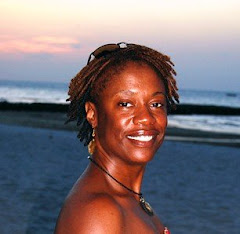 I met the guy in the center of this photo this morning. It's an old picture, so Rye Barcott looks a bit different these days, rockin' a mustache and beard that add a few years to his clean-cut, baby-faced demeanor. Even so, I couldn't stop thinking that I'm old enough to be his mother.
I met the guy in the center of this photo this morning. It's an old picture, so Rye Barcott looks a bit different these days, rockin' a mustache and beard that add a few years to his clean-cut, baby-faced demeanor. Even so, I couldn't stop thinking that I'm old enough to be his mother.Now, don't start haranguing me for being overly-obsessed with my middle-aged status! The only reason I'm even mentioning it in this context is because at 30, Rye Barcott has accomplished more than most people achieve in twice as many years. And you can't really measure the impact of his work in dollars. You'd have to do it in Kenya shillings. 2,000 of them, to be exact.
You see, it was in the year 2000 that Rye Barcott moved to Kibera. I am not making this up. He was an anthropology student at the University of North Carolina-Chapel Hill, on a Marine Corps scholarship. (Take note of the "Marine" reference; it'll be relevant later.) He rented himself a room and lived among the Kibera residents, recording what they told him about their lives.
For five weeks.
One of the people he met was a woman named Tabitha, a registered nurse who basically got all up in his grill and made him ask her about her life. They talked awhile, and when they were through, Tabitha asked him to give her 2,000 shillings, which at today's exchange rate is about $26 USD. She told him she would use the money to buy vegetables, which she would then resell at a bit of a profit to fend for herself and her 2 children. Rye hesitated, because for one, a mzungu (white guy) crazy enough to live in Kibera would be dangerously suicidal if he walked around handing out money. But something about Tabitha made Rye Barcott step out on faith. He gave her the money, fully expecting to never see her again.
Well, Rye came back to Kibera a year later, and who should he bump into but Tabitha, who led him by the hand to the health center she had opened, using his vegetable loan as seed money. She called it the Rye Clinic.
I swear, that story raised the first set of goosebumps I've felt in....well, since meeting the Mystical Mzee Munavu a few weeks ago. In part because when I heard it this morning, I was sitting in the very first Tabitha Clinic in the heart of Kibera. It's a rustic, typically Kiberan collection of tin-roofed, crude cement exam rooms, pharmacy, and open air waiting room that became a lifeline for people living in that part of Kibera. It opened about a year before Tabitha died, at age 38, in December of 2004.
That was also before Rye Barcott, community organizer Salim Mohammad, Tabitha, and Barcott's mentors at the University of North Carolina's Center for Global Initiatives, in partnership with the Centers for Disease Control and Prevention, opened the brand new, modern, 3-storied Tabitha Clinic in the heart of hard core sewage and garbage and hopelessness-filled Kibera. Compared to the original Rye Clinic, it is an absolute miracle. It is St. Elsewhere crossed with General Hospital, with a little Seattle Grace thrown in, for thousands of desperately poor Kenyans, a blessing straight from God.
There's just too much I could say about Rye that would make me sound like a totally annoying suck-up. So I'll just mention a few things. First, after having met one too many young, white "Poverty Tourists" in various African countries, Rye is the most genuine, authentically empathic person I've met in 6 years of doing this work. Trust me, my ears and eyes are finely-tuned for any hint of patronizing, profiteering, or ego-preening when it comes to humanitarian ventures. I've known and heard of too many "volunteers" who launched big bucks government or philanthropic programs solely to line their own pockets, or otherwise exploit astronomically desperate people.
This man is the real-deal Holyfield, you best believe. He speaks fluent Kiswahili, and Homey don't stutter in either language. He interacts with a sincerity that can't be denied, but which doesn't send your blood sugar levels through the roof. And even before you know he's an ex-Marine (or I guess a "Marine for Life"? I mean, you know how sensitive those Jarheads can be!!!), his whole aura exudes a discipline and focus that can't be faked, and usually comes after years of military service.
In short, Rye Barcott has single-handedly adjusted my attitude about Kibera, and about the intractable nature of extreme poverty, in ways I never dreamed possible. I'm rolling up on 3 years living in Africa, and I can't pretend that my spirit hasn't run a quart low at times lately. But after a few short hours of hanging out with Rye, my outlook changed. Instead of obsessing on all the barriers and challenges to interpreting life in Kibera, the fog blew away, and now I'm focusing on the all the possibilities.
Now, don't get me wrong. Princess Rachella ain't about to rent a room there, now or EVUH. A sister needs round the clock access to spa pedicures, mall-shopping and 24 hour wireless, and I wouldn't apologize for that if I was standing at the Gates of Hell with a shot at a free pass to Heaven. I'm also about 70 percent ready to head back to America the minute it's humanly possible. But maybe, for the duration, I'll remember Tabitha, and the 2,000 reasons she believed she had the power to make a difference.





No comments:
Post a Comment